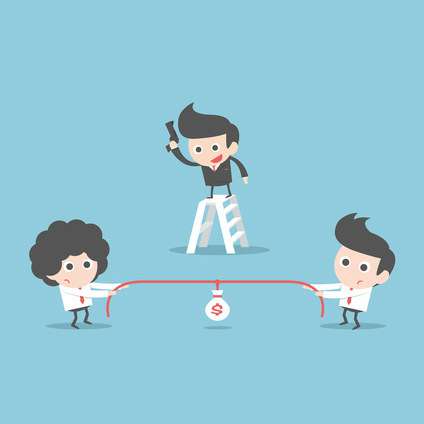You know the old-school ABC of sales: ‘Always Be Closing'. It's hardly practical advice, but it reminds us that closing the deal is everything to a salesperson. From finding prospects, to pitching, to negotiation, it's all designed to ease buyers towards a completed sale.
But one thing affects the outcome of your selling efforts more than anything else. Price. In fact, a prospect's biggest buying objection is price around 80% of the time.
It's hard to ‘Always Be Closing' when you have a price objection. For one, you might not have authority to negotiate on price. And for two, you don't really want to resort to discounting. Your job is to earn the most revenue possible, not just the most sales. And an unprofitable sale is worse than no sale at all.
So, what do you do?
Fortunately, this is not a new problem. Far from it. Salespeople have been dealing with price objections since the earliest civilisations, and techniques for countering them have been honed over centuries.
Negotiation skills training will give you the strongest foundation to overcome price objections.
Even more fortunately, we've rounded up 5 of the best tips for overcoming price objections right here.
So, if you're looking to hone your sales skills and close more deals, read on.

1. Know the competition
Our first tip is about preparation. While it's great to think on your feet, you won't be able to counter every price objection on the fly – unless you know your product and its competitors inside out, that is.
Often, you'll meet prospects who know your market almost as well as you do. They've put a lot of thought into their purchase, researching not just your product but the alternatives too. Many customers use this research as a bargaining tool, knowing they can counter your price offering with that of a lower-priced rival.
That's why you must be ready to show customers why lower-priced alternatives are poorer value overall. Be ready to educate customers on:
• Unique features of your product
• Weaknesses of competing products, such as missing features
• Favourable comparisons of product quality, after-sales service, customer satisfaction scores, or prices
Only with preparation can you overcome price objections related to competing products.
2. Understand their pain points
Experience teaches us that no two customers are the same. Each has different priorities, be they business growth, cost-saving, or convenience. And each has their own unique problems to deal with.
Yet when it comes to price objections, they all say roughly the same thing: "It costs too much!"
This conceals the differences between your customers. And it's hard to counter.
The solution is to get to know your customer and their pain points. Ask them about:
• What they're trying to achieve
• The obstacles that are holding them back
• The day-to-day issues that irritate them
Through these kinds of conversations, you won't just build up a great rapport with customers. You'll also discover new selling points for your product. So, when they say "It costs too much", you can point out how it solves Problem A, B and C they told you about earlier. And their price objection will quickly evaporate.
3. Justify the price
However shiny and innovative the product you're selling, most customers will initially underestimate how much research, experience, and production effort that went into make it. Many will minimise its value, saying things like, "Oh, it's just like <competing product> but with <the one feature they noticed>".
This misunderstanding is your opportunity to set them straight. Tell the story of the product and what makes it so special. You might include:
• All the ways the product saves the customer money. I.e. "It may cost a little more now, but it will pay for itself in the long run".
• A rundown of features the customer might not be aware of, and why they're so valuable
• Some insight into the R&D and production cost that went into making the product

4. Present and remove risk
Often, the price objections customers hold on to the longest are rooted in risk. This is especially true when you're selling a high-ticket product, which requires a big spend or investment up-front. In these cases, the customer is more likely to be cautious – even when they believe in the product and the value it brings. It's natural to have nagging doubts when spending a lot of money, after all.
The best way to ease these fears is to address them directly. Start with good preparation. Through analysis and experience, know the risks your customers will typically associate with your product. These will usually be around ROI, quality, after-sales service, and the longevity of your product.
You should be up-front about perceived risks, addressing them before the customer does if possible. This can increase your credibility, showing you understand the customer's needs and that you aren't trying to hide anything.
But you also need to be ready with proof-points that remove these risks. Good proof points include:
• Quality testimonials from satisfied customers
• Statistics that illustrate the value of the product. These could be from customer satisfaction surveys, independent research, or your own numbers on cost against savings.
A great way to present proof-points is in printed marketing collateral like brochures. These can serve as a reminder for you during meetings. And you can leave them with the customer afterwards.
5. Work on changing their value perception
Finally, you should keep in mind the important concept of value perception when countering any price objection. Value perception is simply what the customer thinks your product is worth.
But remember – the customer probably knows much less about it than you do. They may have flicked through a brochure, or seen a YouTube video, or they may be hearing about it for the first time from you today. So, when they say "It's too much", there's a good chance they aren't appreciating the true value of the product.
Use the tips in this article to change their value perception. You can also focus on:
• Features you know will be valuable to the customer
• Favourable comparisons between the product price and savings/value it offers
• Favourable price comparisons with competitors
• Risks of not buying the product, such as lost productivity or savings
All these things can increase the value of your product to the customer.
Now you're ready to sell more
Nobody can ‘Always Be Closing'. You can't complete the sale 100% of the time. But the next time a prospect says, "I'd love to buy, but the price is too high", you'll be well prepared to counter their objections with great reasons to buy. And you can greatly increase your conversion rate over time. You'll also have a lot more confidence when pitching and negotiating with customers.
Good luck!
























